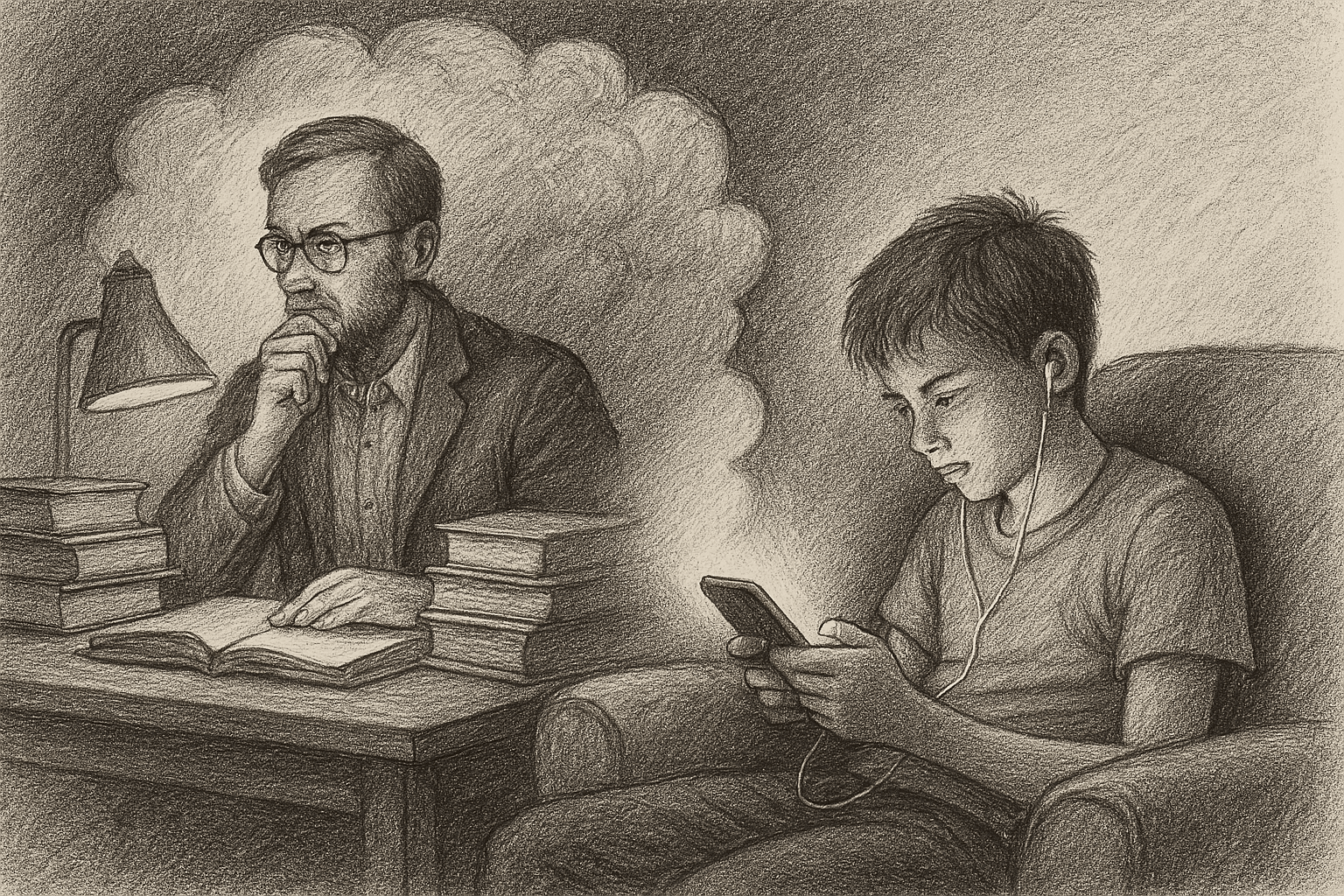“Distraction is the biggest tax you’ll pay.” – Ben Handler
“Silence is no longer just a luxury, it’s a rebellion.” – Shaun Bonétt
We are living through a silent crisis. Not one marked by headlines or breaking news banners, but one unfolding quietly in the hands of every child, teenager, and adult glued to a screen. The cost? Our attention, our ability to think deeply, and perhaps most worryingly, our ability to be present in the world around us.
These two quotes struck a chord with me this week. Ben Handler, founder of the BAI, constantly shares insight that challenges the way we think and act. His words about distraction being the greatest tax we pay are brutally accurate. Shaun Bonétt, Founder and CEO of Precision Group, recently posted on LinkedIn that the most radical move we can make in 2025 is to unplug. He highlights that we now scroll instead of think, react instead of reflect. It begs the question: are we entering an era of the deterioration of thought?
A Culture of Constant Distraction
Recent research from the University of California Irvine shows it takes an average of 23 minutes and 15 seconds to return to a task after being interrupted. Yet we live in a world where interruptions are constant, largely self-inflicted through our phones and social media. According to Common Sense Media, teens now average over 8.5 hours of screen time per day, and kids aged 8–12 are not far behind, averaging 5.5 hours.
For adults, it’s no better. Data from RescueTime found that most people check their phones 58 times per day, with the majority of these being during work hours. This isn’t just a time issue — it’s a cognitive one. Studies from the University of Texas show that the mere presence of a smartphone — even when turned off — reduces available cognitive capacity.
It’s Not Just the Kids
While we often talk about digital distraction in the context of teenagers, the reality is adults are just as affected. We’ve normalised a state of permanent partial attention, jumping between emails, group chats, and TikTok clips — often without completing a single deep task.
A study from Microsoft suggests the average human attention span has dropped from 12 seconds in 2000 to just 8 seconds today — less than that of a goldfish. This erosion of attention has serious implications for how we learn, work, and interact.
Why This Matters
The ability to think deeply, critically, and independently is what drives innovation, empathy, and leadership. When kids can’t sit still without a device, or when adults feel anxious without checking notifications, we’ve got a problem that transcends inconvenience — it’s rewiring our brains.
This constant mental noise can impact:
- Academic performance
- Sleep quality
- Mental health (especially anxiety and depression)
- Creativity and problem solving
What Can We Do About It?
The good news is we can reclaim control. It starts with awareness, but it takes action. Here are some strategies to help both kids and adults unplug, refocus, and rebuild attention:
For Parents and Kids:
- Start with small digital detoxes – Try Shaun Bonétt’s recommendation of 3 hours per day device-free.
- Tech-free zones – No phones in bedrooms, at dinner tables, or during study time.
- Encourage boredom – Unstructured time is essential for creativity and critical thinking.
- Teach focus – Introduce tools like the Pomodoro Technique or mindfulness apps like Smiling Mind.
- Model the behaviour – Kids learn by example. If they see you constantly online, they’ll mirror it.
For Adults:
- Use app blockers – Tools like Freedom or Forest can reduce mindless scrolling.
- Schedule deep work – Protect time in your day where distractions are off-limits.
- Prioritise real-world connection – Go for a walk, have a phone-free coffee catch-up, or read a book.
Final Thought
We don’t need more content. We need more clarity. And as Shaun Bonétt puts it, the future won’t be built by those who are endlessly distracted, but by those who dare to unplug.
Let’s help our kids — and ourselves — rediscover the power of silence, focus, and original thought. That’s not just a productivity hack. It’s a rebellion worth joining.

